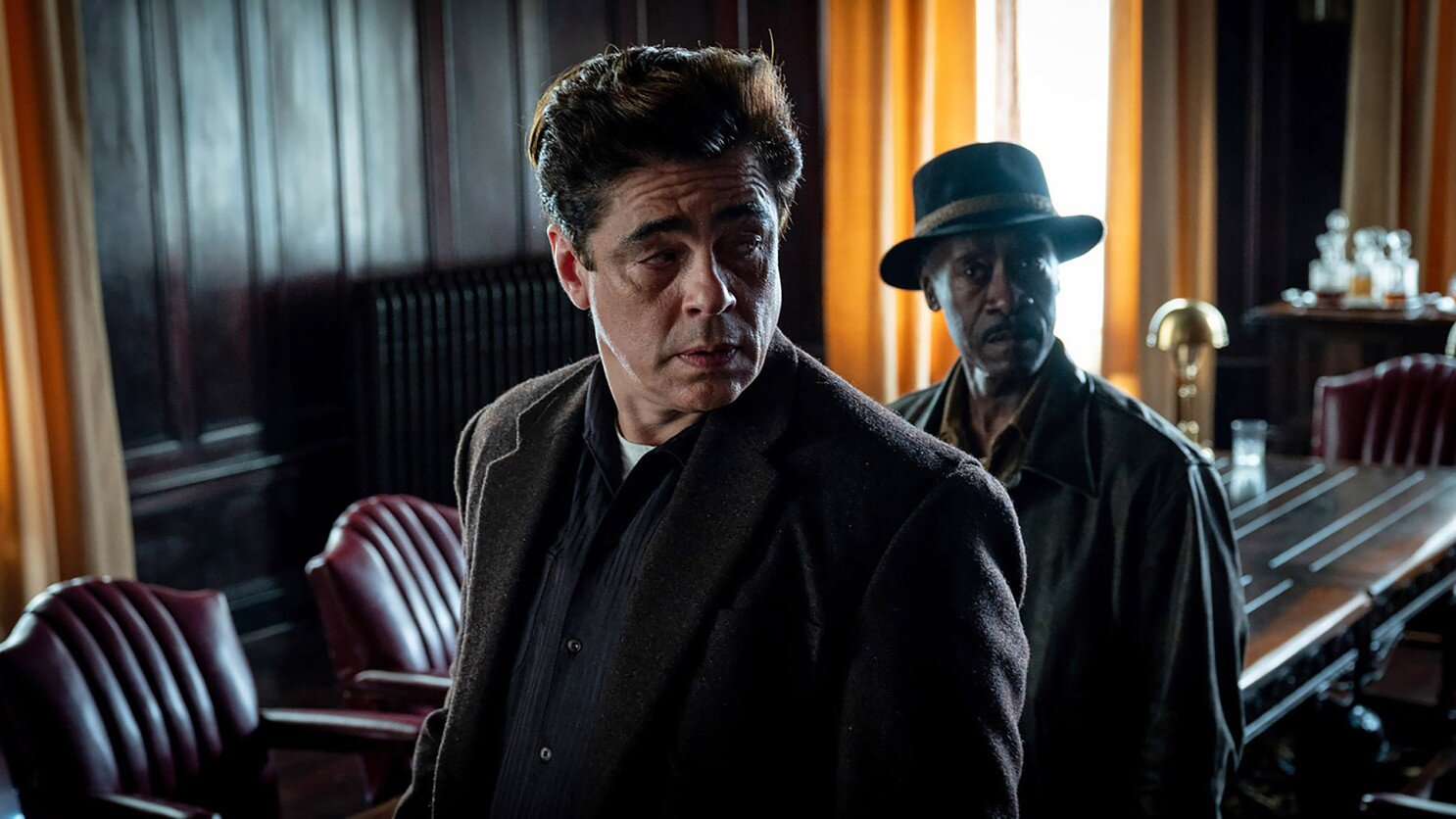Review: No Sudden Move (2021)
In 1998, Steven Soderbergh made perhaps the best film of his career in adapting Elmore Leonard’s easygoing crime novel, Out of Sight, to the big screen. The film captured Leonard’s colourful characters, clear plotting, and impeccable cool in a manner only matched by Quentin Tarantino’s Jackie Brown, an adaptation of Leonard’s Rum Punch from the previous year. Soderbergh’s most recent film, No Sudden Move, which debuted on HBOMax, plays somewhat like a warped period-piece version of Out of Sight. It drops the romantic angle, but still situates a bunch of ex-cons and criminals in over their head in a heist plot in 1950s Detroit. The film’s greatest pleasures come from its attention to character detail and its patient plotting of criminal screwups.
Two career criminals, Don Cheadle’s Curt Goynes and Benicio del Toro’s Ronald Russo, are hired to blackmail Matt Wertz (David Harbour), an accountant for a car company, in order to access a mysterious document hidden in his boss’s safe at the office. Of course, things don’t go according to plan—they never do in criminal stories of this sort. Curt and Ronald are forced to work together despite personal and racial animus towards each other, as each of them have different ideas of how to get away alive with the money.
Much of the pleasure of No Sudden Move is in watching the talented cast perform the many confrontations and recalculations. The number of good performers in the film is notable: there’s Cheadle and del Toro, but also Harbour, Amy Seimetz, Jon Hamm, Ray Liotta, Kieran Culkin, Brendan Fraser, Bill Duke, Julia Fox, and a big-name star whose appearance I won’t spoil. Cheadle is especially good in the lead as Curt, bringing his voice down to a low growl, generally keeping quiet and watching others in order to use their assumptions about him against them. Just watch the way he watches others in this film, how he stays in the corner of a room and reads the performers opposite him; it’s subtle, physical performing at its finest. Channeling the maxim of the title, Cheadle gives a patient performance in a patient film, one that doesn’t rush with the plotting and is content to slow things down as characters think their way out of one blunder after another.
While No Sudden Move isn’t technically based on an Elmore Leonard work—Ed Solomon wrote the screenplay—and doesn’t rely on humour to the extent Leonard does, it does share his penchant for easygoing pacing and character-based plotting. In Leonard’s work and in this film, the crime narrative is not constructed like clockwork, but rather improvised. There’s the basic heist set-up and then everything that happens in the aftermath is a result of character, of watching these specific characters do or not do things due to their personal foibles. It’s a satisfying manner of writing crime stories, even if it doesn’t have the razzle-dazzle twists that are so popular in thrillers these days, or even compared to something as clockwork as Soderbergh’s own Ocean’s 11.
The film never succumbs to twisty machinations, but it does acquire a case of didacticism as it goes on. Once a certain big-name actor shows up to talk business with Curt and Ronald, the film acquires an enforced topicality that rubs up uneasily against the character-based nature of the plotting. It’s not fatal, but the unspoken topicality of the film, of how it examines racial relationships in the dynamics between the characters, especially Curt and Ronald, and how it views everything through the lens of economic necessity, is far more effective than the obvious gestures at the future of the car industry in the later parts of the film.
I’d be remiss if I didn’t at least mention the experimental visuals of much of No Sudden Move. While it’s unclear whether Soderbergh shot part of the film on iPhone as he did previous films like Unsane and High Flying Bird, the visuals are truly bizarre and off-putting. Soderbergh, serving as his own cinematographer as he often does, warps nearly every wide frame in the film, pushing the digital sensors and wide lens to their furthest limits. In early moments, it gives an intriguing, otherworldly pallour to establishing shots, but it grows tedious when you realize Soderbergh is committed to using the warping technique throughout. Sometimes, talented directors grow too enamoured of their toys and need to realize that visual experimentation and amplification are only good in-so-far as they serve the material. If the film were shot more conventionally, it’s likely it’d be more effective, because this manner of experimentation distracts from the straightforward content of the film. Something this easygoing and unassuming shouldn’t have a visual form that makes you think about the people behind the camera instead of those in front of it. A more invisible camera approach would’ve been preferable.
Still, there’s a lot to admire about No Sudden Move. The cast is exceptional, the writing is mostly solid, and while Soderbergh’s framing is unsettling, he still knows how to block individual scenes in visually intriguing ways. It reminds you of Out of Sight and the works of Elmore Leonard in parts, which is enough to bring it over the finish line and make it stand out from the generic crime thrillers that flood streaming services these days.
6 out of 10
No Sudden Move (2021, USA)
Directed by Steven Soderbergh; written by Ed Solomon; starring Don Cheadle, Benicio del Toro, David Harbour, Amy Seimetz, Jon Hamm, Ray Liotta, Kieran Culkin, Noah Jupe, Brendan Fraser, Bill Duke, Julia Fox, Frankie Shaw, Craig Grant, Byron Bowers, Hugh Maguire.



Nia DaCosta’s sequel to 28 Years Later pits two competing theologies of death against each other.